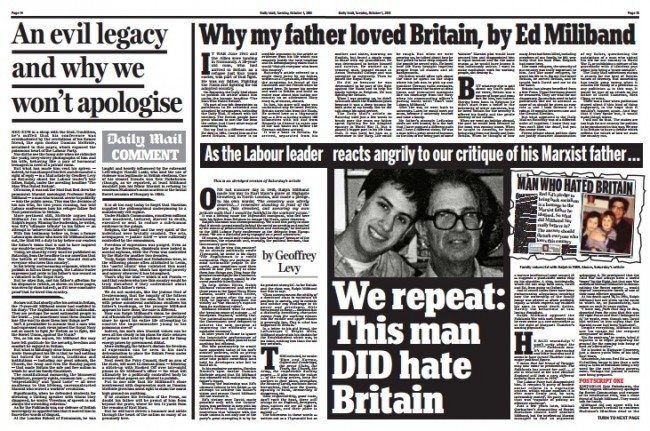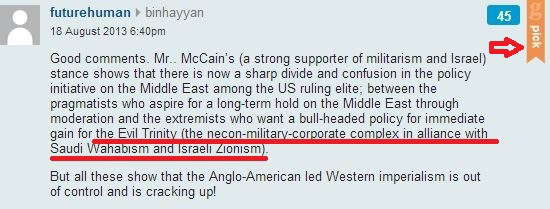Irony Overload: The Guardian says the Daily Mail is anti-Semitic
WHEN it comes to talking of anti-Semitism in newspapers, who better than the Guardian to bring the Daily Mail to order over its Ralph Miliband hatchet job? The Guardian is the paper in which Richard Imgram told readers:
I have developed a habit when confronted by letters to the editor in support of the Israeli government to look at the signature to see if the writer has a Jewish name. If so, I tend not to read it.
The Guardian is subtle in its bigotry, doing down the Jews claims to a homeland.
The Guardian called Egypt’s former leader Mohamed Morsi ”the acceptable face of moderate Islamism“. Really? This is him calling Jews “apes and pigs“.
In 2011, following the Labour mayoral candidate Ken Livingstone’s loss to Boris Johnson, The Guardian wrote this:
“How much damage did he [Ken] inflict by failing to make peace with the Jewish political establishment…”
The Guardian knew that was a slight and removed the allusion to a cabal of controlling Jews.
And Guardian Readers’ Editor, Chris Elliott noted his paper’s anti-Jewish credentials when he wrote:
For antisemitism can be subtle as well as obvious. Three times in the last nine months I have upheld complaints against language within articles that I agreed could be read as antisemitic. The words were replaced and the articles footnoted to reflect the fact. These included references to Israel/US “global domination” and the term “slavish” to describe the US relationship with Israel; and, in an article on a lost tribe of Mallorcan Jews, what I regarded as a gratuitous reference to “the island’s wealthier families”.
Two weeks ago a columnist used the term “the chosen” in an item on the release of Gilad Shalit, which brought more than 40 complaints to the Guardian, and an apology from the columnist the following week. “Chosenness”, in Jewish theology, tends to refer to the sense in which Jews are “burdened” by religious responsibilities; it has never meant that the Jews are better than anyone else. Historically it has been antisemites, not Jews, who have read “chosen” as code for Jewish supremacism.
Get a load of that cartoon, showing the Jews controlling our elected leaders as puppets:
The Mail used the world “evil” in its hatchet job on Ralph Miliband. The Guardian’s comments moderator thought this comment worth a read:
That’s some of the background against which the Guardian’s Johnathan Freedland writes:
Antisemitism doesn’t always come doing a Hitler salute – Hatred of Jews is often more coded than explicit, but the Daily Mail’s attack on Ralph Miliband pressed all the same old buttons
Quite. He should see Guardian’s archives.
Howard Jacobson noted how anti-Israel reporting is often a cloak for anti-Semitism:
Take Michael Billington’s somnolent review of the play [Caryl Churchill’s Seven Jewish Children] in the Guardian. I would imagine that any accusation of anti-Semitism would horrify Michael Billington. And I certainly don’t make it. But if you wanted an example of how language itself can sleepwalk the most innocent towards racism, then here it is. “Churchill shows us,” he writes, “how Jewish children are bred to believe in the ‘otherness’ of Palestinians…”
It is not just the adopted elision of Israeli children into Jewish children that is alarming, or the unquestioning acceptance of Caryl Churchill’s offered insider knowledge of Israeli child-rearing, what’s most chilling is that lazy use of the word “bred”, so rich in eugenic and bestial connotations, but inadvertently slipped back into the conversation now, as truth. Fact: Jews breed children in order to deny Palestinians their humanity. Watching another play in the same week, Billington complains about its manipulation of racial stereotypes. He doesn’t, you see, even notice the inconsistency.
Back to Freedland:
When the Ukip politician Godfrey Bloom referred to “Bongo Bongo land”, there were not many who denied the remark was racist. When the same man told women who failed to clean behind the fridge that they were “sluts”, most could see the comment was sexist. Yet when the target of an insult is a Jew or Jews, there is rarely such certainty. Unless antisemitism comes dressed in an SS uniform and doing a Hitler salute, we are regularly thrown into confusion. Suddenly we are in the seminar room, calling on experts to tell us whether or not this or that sentence was anti-Jewish, the debate usually ending without clear resolution. To add to the complexity, very often Jews disagree among themselves, with just as many willing to give the disputed word or deed a free pass as to condemn it.
You can read it all The hypocrisy is breathtaking and laughable. Say “I hate the Mail” and wait for the Twitter applause. Say the same of the Guardian and you’re called a fascist or a fool.
So it has been this week with the Daily Mail’s sustained assault on the late Ralph Miliband, the Marxist scholar it branded “The Man Who Hated Britain”. Some detect a whiff of anti-Jewish prejudice, some swear there is no such thing. When pressed on the point by the BBC, Ed Miliband himself declined to add antisemitism to his list of charges against the paper…
Despite the name, it is not a phenomenon safely buried in the past. Just because hatred of Jews reached a murderous climax in the 1940s does not mean it ended with the war in 1945. It is alive and well even in 2013…
In the antisemitic imagination, Jews are constantly working for some other, hidden goal. In this, antisemitism stands apart from other racisms, which tend to view the hated as straightforwardly inferior. Antisemitism is instead a conspiracy theory of power, believing that the Jews – always operating as a collective – are bent on some grand plan of world domination. Which is why images of Jews as puppet masters, or of having the world in their “financial grips”, as Baroness Jenny Tonge so memorably put it, always hit a nerve…
And always on hand for the antisemite is some reference to Jews’ religious practice, real or imagined. For centuries, those who hate Jews would throw the phrase “chosen people” back in their faces, falsely interpreting it as a mandate for Jewish supremacism.
Freedland is a Jew (Ingram take note):
Ah, but hasn’t the Mail been defended on TV by Jewish employees and hasn’t the odd rabbi said they did nothing wrong? This happens every time, too. But it’s not much of a defence. Every feminist knows a woman can always be found to say she sees no sexism, no matter how grave the offence to her fellow women. Why is it a surprise that some Jews will decide it doesn’t suit them to make a fuss, that they’d rather keep their heads down and get on? After all, it’s only antisemites who believe Jews operate not as individuals but in lockstep with each other, in pursuit of imagined Jewish goals. For that reason, it is neither here nor there that a Jewish reporter wrote the original piece. Besides, the most toxic elements were the headline and subsequent editorial – and those are the responsibility of the editor.
Antisemitism can seem a subtle, elusive business. Calling it out can feel too much like hard work, often prompting a torrent of abuse as hurtful as the original offence. But it has to be named for what it is – and not only by Jewish writers like me. History could not be clearer on this last point. Antisemitism may start with the Jews – but it rarely ends with the Jews.
Ha bloody ha.
Posted: 6th, October 2013 | In: Key Posts, Reviews 0 Comments | TrackBack | Permalink





